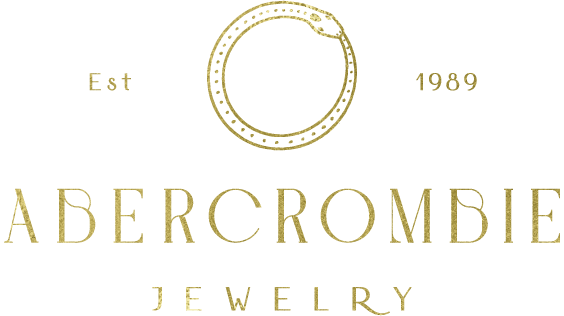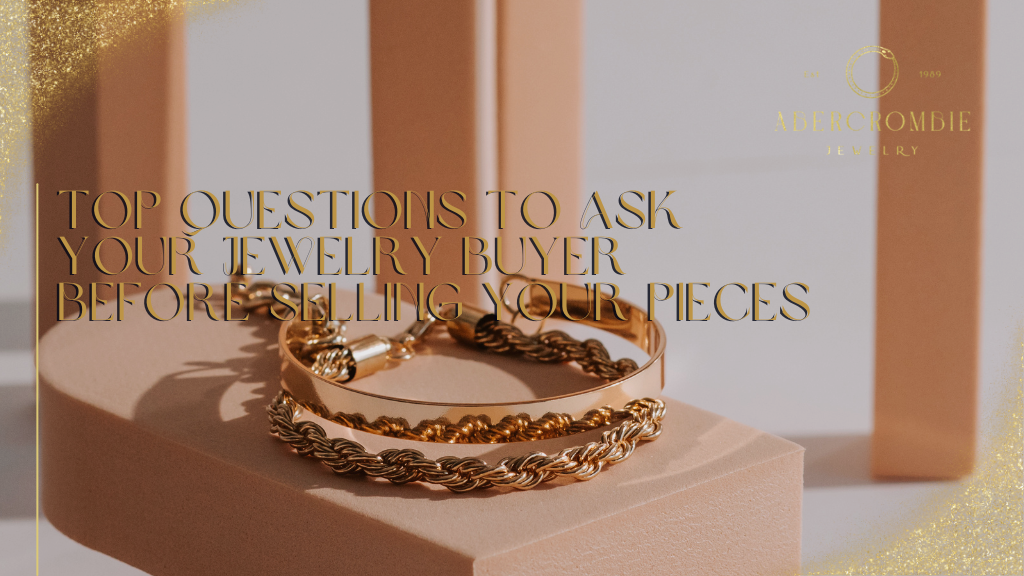- Key Takeaways
- What Are Your Credentials?
- How Long Have You Been Buying?
- Are You Licensed and Insured?
- How Do You Determine Value?
- What Is Your Appraisal Process?
- Can You Provide References?
- Do You Offer Immediate Payment?
- How Do You Ensure Security?
- What Are Your Fees or Commissions?
- Will You Provide a Written Offer?
- Frequently Asked Questions
- Conclusion
When you’re ready to sell your jewelry, you should know what questions to ask your jewelry buyer. Start by inquiring about the buyer’s credentials and experience to guarantee they’re reputable. Don’t forget to ask how they determine the value of your pieces and their appraisal process. It’s also essential to understand their payment methods and processing times. Additionally, consider their security measures for handling your valuable items. Curious about their fees or commissions? Abercrombie Jewelry will offer essential elements for a seamless transaction, and you should be aware of them to safeguard your investment and secure the best deal.
Key Takeaways
- Do you hold certifications from recognized gemological institutions like GIA or IGI?
- What appraisal methods and criteria do you use to determine the value of my jewelry?
- What payment options do you propose, and how fast can I expect to acquire the funds?
- What security measures are in place to protect my jewelry during the appraisal and sale process?
- Can you provide a written offer with all terms clearly outlined?
A useful blog to read: Vintage Jewelry Buyers: How to Spot the Best Deals and Avoid Scams
What Are Your Credentials?
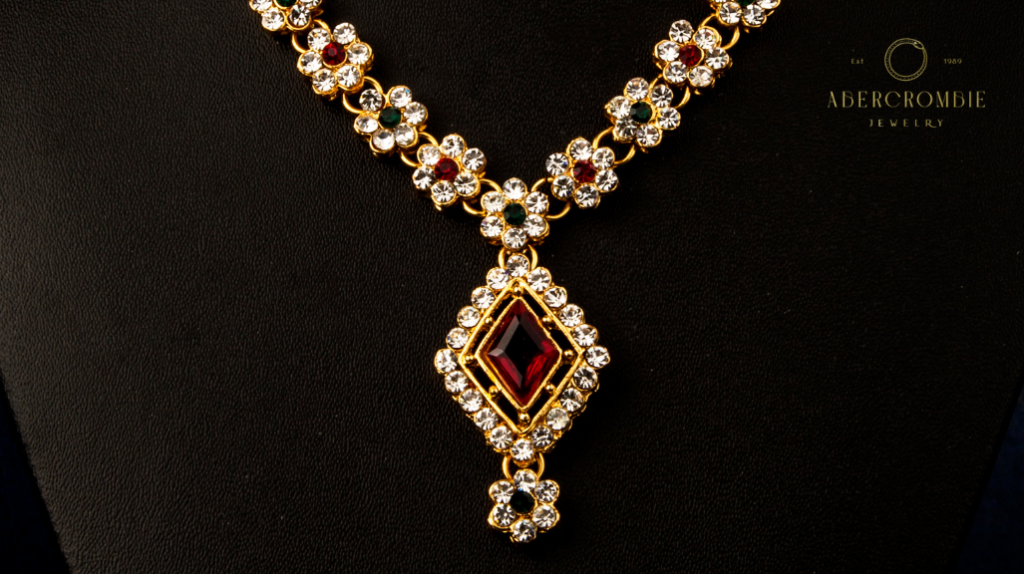
When you’re preparing to sell jewelry, one of the first questions possible buyers will ask is about your credentials. Having your credentials verified is essential to establishing trust and credibility. You’ll want to highlight certifications from recognized gemological institutions, such as the Gemological Institute of America (GIA) or the International Gemological Institute (IGI). These credentials show that you possess the required knowledge and skills to assess and value jewelry accurately. Your experience assessment is equally important to formal certifications. Buyers often feel more comfortable knowing you’ve been in the industry for a substantial period. Emphasize your years of expertise, the types of jewelry you’ve handled, and any notable transactions or clients. This helps create a sense of belonging for the buyer, making them feel part of a knowledgeable community. Remember to mention affiliations with professional organizations, such as the National Association of Jewelry Appraisers (NAJA) or the American Gem Society (AGS). These memberships further validate your credibility and commitment to ethical practices.
How Long Have You Been Buying?
Buyers not only want to know about your credentials but also seek affirmation about your experience in the field. Asking how long a jewelry buyer has been in business can give you critical insights into their reputation and expertise. The experience’s significance shouldn’t be underestimated; it speaks volumes about their ability to accurately appraise and offer fair prices for your pieces.
Here’s a quick reference table to guide your conversation:
| Question | Why It Matters? |
| What types of jewelry do you specialize in? | Longevity indicates stability and trustworthiness. |
| What types of jewelry do you specialize in? | Specialization can enhance the accuracy of appraisals. |
| Can you share client testimonials? | Positive feedback builds confidence in their services. |
| Have you handled high-value transactions? | Experience with valuable pieces demonstrates competence. |
A buyer’s reputation is often built over years of consistent, reliable service. Knowing their history can help you feel more secure in your decision. Don’t hesitate to ask follow-up inquiries for clarity. The more you know about their experience, the better you can gauge their ability to handle your jewelry with the respect and precision it deserves. Engaging with an experienced buyer guarantees you’re not just another transaction but a valued client.
Are You Licensed and Insured?
Guaranteeing that a jewelry buyer is licensed and insured is essential for protecting your interests. When you’re ready to sell your precious pieces, you need to know that the buyer you choose has a solid buyer reputation and the necessary credentials. Licensing demonstrates compliance with local regulations, providing peace of mind. Insurance protects valuables from damage or loss during the transaction.
Here are a few critical points to take into account:
- Licensing: Verify the buyer has all required licenses, indicating they operate legally and ethically.
- Insurance Coverage: Confirm they’ve adequate insurance to cover any potential mishaps involving your jewelry.
- Reputation: Read reviews and testimonials to gauge their standing in the community.
- Transparency: A reputable buyer will have no problem sharing their credentials and insurance details.
A licensed and insured buyer isn’t just a legal requirement; it signals professionalism and trustworthiness. You deserve to feel secure and confident about who you’re working with. By confirming these aspects, you align yourself with a buyer who values your jewelry as much as you do.
How Do You Determine Value?
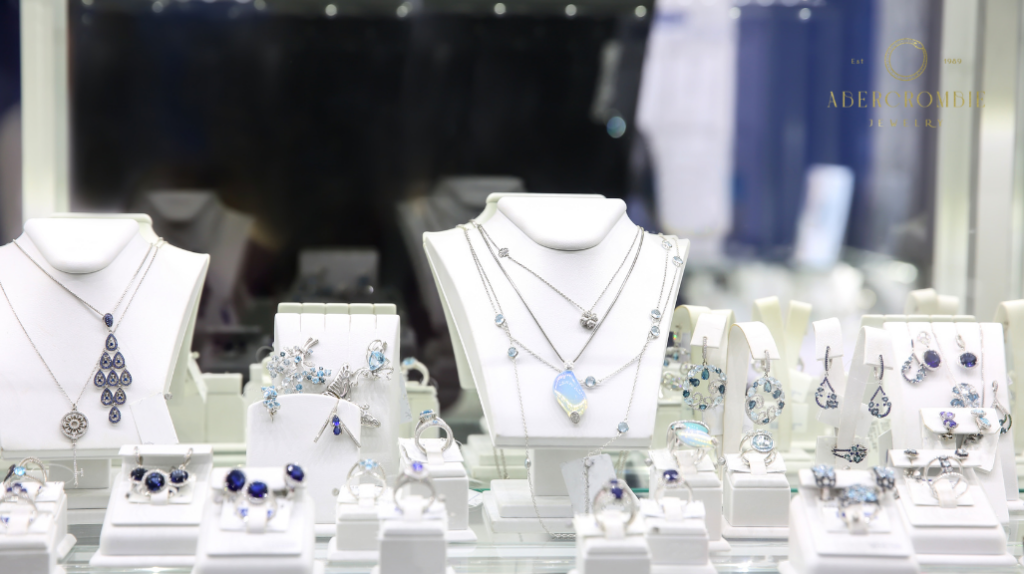
When determining the value, you need to consider the jewelry appraisal methods, including professional evaluations and market analyses. Investigating current market trends and demand for similar pieces is essential. Additionally, certification and authenticity documents play a significant role in establishing and verifying the true worth of your items.
Appraisal Methods Used
Determining the value of jewelry hinges on a blend of expertise, precision, and established methodologies. When you’re ready to sell your pieces, understanding the appraisal techniques used by your buyer is essential. Professional appraisers utilize a combination of valuation standards to guarantee an accurate and fair assessment of your jewelry.
Here are some key appraisal methods you should inquire about:
- Market Comparison: This technique involves comparing your jewelry to similar pieces recently sold. It provides a current market value based on real-world data.
- Replacement Cost: This method focuses on the cost of replacing your jewelry with a similar piece, considering current material and craftsmanship costs.
- Income Approach: Although less common for jewelry, this technique assesses the potential income the piece could generate. It is often used for highly rare or investment-grade items.
- Intrinsic Value: This approach evaluates the value of the raw materials (gold, diamonds, etc.) and craftsmanship, independent of brand or historical significance.
Market Value Factors
Understanding what factors influence the market value of your jewelry can greatly enhance your selling strategy. First, market trends play a significant role. Jewelry styles and demand fluctuate over time, impacting resale value. Stay informed about current trends and historical data to gauge the best time to sell. Second, the materials and craftsmanship of your piece are essential. High-quality metals, rare gemstones, and exceptional artistry typically attract higher offers. Buyers will assess these attributes to determine the intrinsic value. The condition also matters. Pristine pieces with minimal wear and tear will fetch better prices. Regular maintenance and proper storage can preserve your jewelry’s appeal. Rarity and provenance add another layer of value. Unique designs or pieces with historical significance often command premium prices. Buyers look for items that stand out in the market. Lastly, don’t overlook the significance of brand reputation. Renowned brands with a legacy of excellence often have higher resale values. Familiarize yourself with which brands are currently desirable.
Certification and Authenticity
Certification and authenticity are paramount to accurately gauge the value of your jewelry. When selling your pieces, you need to be certain that your buyer has the expertise to evaluate them properly. Understanding how they determine value will guarantee you a fair price. First, ask your buyer about their process for gem identification. Certified gemologists can verify your gemstones’ type, quality, and characteristics, which greatly impacts their value. Additionally, inquire if they use advanced tools and technology to support their assessments. Next, consider antique valuation. If your jewelry has historical significance, its age and provenance can add value. Confirm the buyer is experienced in appraising antiques and has access to relevant historical data.
Here are key questions to ask:
- Do you have certification from a recognized gemological institute?
- What methods do you use for gem identification?
- How do you assess the value of antique pieces?
- Can you provide documentation for your valuation process?
What Is Your Appraisal Process?
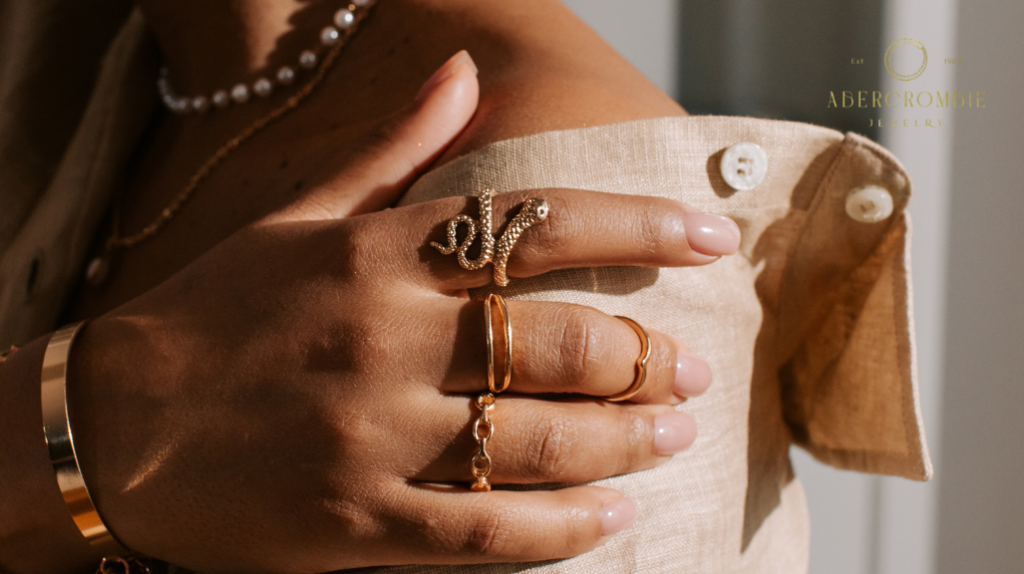
When you inquire about our appraisal process, you’ll find we use stringent evaluation criteria, including the gemstone quality, metal type, and overall craftsmanship. Our appraisers must have formal qualifications and certifications from recognized gemological institutions. This guarantees that your jewelry is assessed with the highest expertise and accuracy.
Evaluation Criteria Used
Our appraisal process hinges on a meticulous set of evaluation criteria designed to confirm each piece of jewelry is accurately assessed. Understanding our evaluation methods can give you confidence in the process and guarantee you get the best value for your jewelry.
We follow these key grading standards:
- Gemstone Quality: We assess the 4 Cs—cut, color, clarity, and carat weight—to determine the value of any gemstones in your piece.
- Metal Content: We confirm that the metal content of gold, silver, and platinum has been correctly identified and valued by testing their purity.
- Condition and Craftsmanship: Your jewelry’s overall condition and craftsmanship are examined, including any signs of wear, repairs, or unique design elements.
- Market Demand: We consider current market trends and demand for similar pieces, which can notably impact the appraisal value.
These evaluation methods are designed to be thorough and reliable, aligning with industry-leading grading standards. Adhering to these criteria guarantees that every piece is appraised fairly and accurately. This meticulous approach fosters trust and belonging, making you feel confident in selling your jewelry with us.
Appraiser’s Qualifications Required
Qualified appraisers are the cornerstone of our appraisal process, guaranteeing that your jewelry is assessed with the highest level of expertise. Knowing the appraiser’s qualifications is vital when selling your precious pieces. These experts should have extensive appraisal experience and meet stringent certification requirements.
Appraiser Qualifications
| Qualification | Description | Importance |
| Certification | Credentials from recognized institutions | Guarantees adherence to industry standards |
| Experience | Years of hands-on appraisal work | Provides depth and accuracy in valuation |
| Continuing Education | Ongoing training and courses | Keeps appraisers up-to-date with trends |
Before you entrust your jewelry to an appraiser, ask about their certification requirements. They should be certified by respected organizations like the Gemological Institute of America (GIA) or the American Society of Appraisers (ASA). These certifications show a commitment to professionalism and expertise.
Moreover, inquire about their appraisal experience. An appraiser with a robust background will likely provide a more accurate and fair valuation. Don’t hesitate to ask how they stay current in the field. Ongoing education is important for adapting to market changes and technological advancements, guaranteeing you receive the best possible appraisal for your jewelry.
Can You Provide References?
A reputable jeweler should have no hesitation in providing references. Asking for references is essential to guaranteeing the buyer’s credibility and reliability. It’s also a way to gauge the overall buyer experience and understand how the jeweler treats its customers. Customer testimonials can offer useful insights into the jeweler’s professionalism and integrity.
When requesting references, consider asking for the following:
- Previous client testimonials: These can provide first-hand accounts of others’ experiences with the jeweler, highlighting both positive and negative aspects.
- Professional affiliations: Check if they belong to any recognized jewelry associations, which can indicate their standing in the industry.
- Years in business: A jeweler with a long history is likelier to have established a reputation for fair practices.
- Repeat customers: Frequent return customers can signal trust and satisfaction with the jeweler’s services.
Do You Offer Immediate Payment?
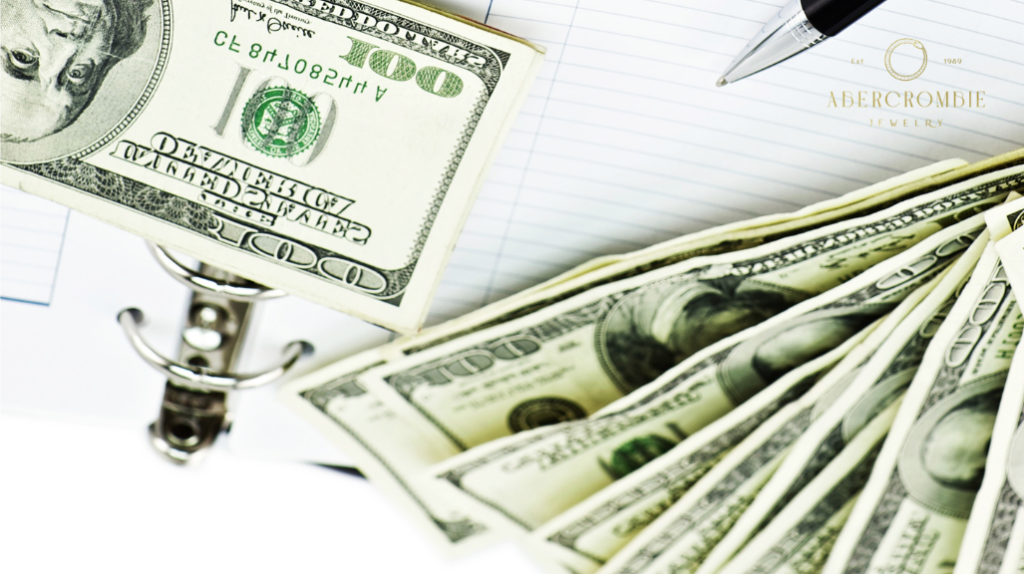
When selling your jewelry, knowing if immediate payment is available is important. We offer various payment methods, including bank transfers and PayPal, to guarantee you receive your funds promptly. The payment processing time is typically minimal, allowing you to access your money quickly after the sale.
Payment Method Options
Offering a range of payment methods can greatly enhance your customer experience, making it seamless and efficient. When you’re selling your jewelry, understanding your payment options is essential. Ask your buyer if they offer immediate payment and explore the various methods available. This guarantees you can choose the best fit for your needs and preferences.
Consider asking about:
- Cash offers: Cash is often the quickest and most straightforward payment method. It’s immediate and hassle-free, guaranteeing you walk away with money.
- Bank transfers: If you prefer digital transactions, bank transfers provide a secure and fast way to receive payment directly into your account.
- Checks: Although less immediate, checks are a valid option for those who prefer having a paper trail for their transactions.
- Trade options: Some buyers might allow you to trade your jewelry for other pieces, which can be a terrific way to refresh your collection without spending additional money.
Knowing these options helps you feel confident and secure about the transaction, fostering a sense of belonging and trust with your jewelry buyer. Always guarantee that the payment method aligns with your comfort and convenience.
Payment Processing Time
Understanding your payment options is one part of the equation; knowing how quickly you’ll receive your payment is equally important. When selling your jewelry, ask your buyer if they offer immediate payment. Immediate payment guarantees you won’t be left waiting, which can be particularly important if you rely on the funds for something specific. Different jewelry buyers have varied payment processing times, so clarity on this aspect is essential. Some buyers offer instant payments via cash or electronic transfer, while others may take a few days to process your transaction. Ask about the exact timeframe and verify it aligns with your expectations. Transaction security is another factor to consider. Quick payments are great, but you need to be confident in the transaction’s safety. Reputable buyers will have secure systems to protect your personal and financial information. Don’t hesitate to ask how they maintain transaction security during payment.
How Do You Ensure Security?
Ensuring security in jewelry selling is vital to protect your inventory and customers’ trust. When you’re ready to sell your precious pieces, ask your buyer about their security measures. These steps are essential for theft prevention and ensuring your valuables are handled carefully.
To foster a sense of community and trust, make sure your buyer addresses the following points:
- Secure Transportation: Are they using insured couriers or armored transports to move your jewelry?
- On-Site Security: Does their facility have 24/7 surveillance cameras and alarm systems?
- Employee Vetting: Are their staff members thoroughly background-checked and trained in security protocols?
- Insurance Coverage: Is there extensive insurance to cover potential losses or damages?
Inquiring about these security measures demonstrates your commitment to safeguarding your inventory. This protects your assets and shows your customers that you prioritize their trust and safety. In a market where reputation is everything, ensuring high theft prevention and security standards can set you apart. Your vigilance and attention to security will not only protect your pieces but also foster a sense of trust and belonging within your community.
What Are Your Fees or Commissions?
When selling your jewelry, it’s critical to understand the fees or commissions involved to ascertain you’re getting a fair deal. Asking about fee structure and commission rates upfront can save you from unexpected deductions that might affect your profit. A reliable buyer will be transparent about their fees and will explain any costs you might incur during the selling process.
Here’s a simple table to guide you through what you should inquire about:
| Question | Reason |
| What is your fee structure? | Understand how fees are calculated |
| What are your commission rates? | Know the percentage taken from your sale |
| Is there a minimum fee? | Ascertain small sales aren’t disproportionately charged |
| How are fees deducted? | Clarify if fees are deducted from the sale price or paid upfront |
| Are there any additional costs? | Identify hidden fees |
Will You Provide a Written Offer?
After grasping the fee structure and commission rates, the next step is to confirm you get a written offer for your jewelry. Having written documentation is vital in the offer negotiation process. It guarantees transparency and provides a solid reference for both parties.
Here’s why you should insist on a written offer:
- Clarity: A written offer outlines all terms clearly, preventing misunderstandings.
- Record Keeping: It serves as a formal record, which is helpful for future reference.
- Negotiation Leverage: Written documentation can strengthen your position during negotiations.
- Legal Protection: It offers legal backing if disputes arise later.
When you ask for a written offer, you’re not just being meticulous but safeguarding your interests. Jewelry buyers should be willing to provide this without hesitation. A transparent buyer understands the value of clear communication and respects your need for documented agreements. Before finalizing any deal, review the document carefully. Confirm it includes critical details like the item description, offer amount, and any conditions related to the sale. This step is essential for peace of mind and a smooth transaction. Always prioritize your protection by securing a well-documented offer that aligns with your goal of a trusted and inclusive selling experience.
Frequently Asked Questions
Conclusion
Maneuvering the jewelry market is like steering a ship through foggy waters. By asking these essential questions, you’ll illuminate your path and guarantee a safe harbor for your treasures. Consider your inquiries as a compass guiding you toward a fair and secure transaction. With the right knowledge, you’ll sail smoothly, avoiding hidden rocks of uncertainty and ensuring your precious pieces are valued and protected. Your diligence now is the key to a successful voyage.
